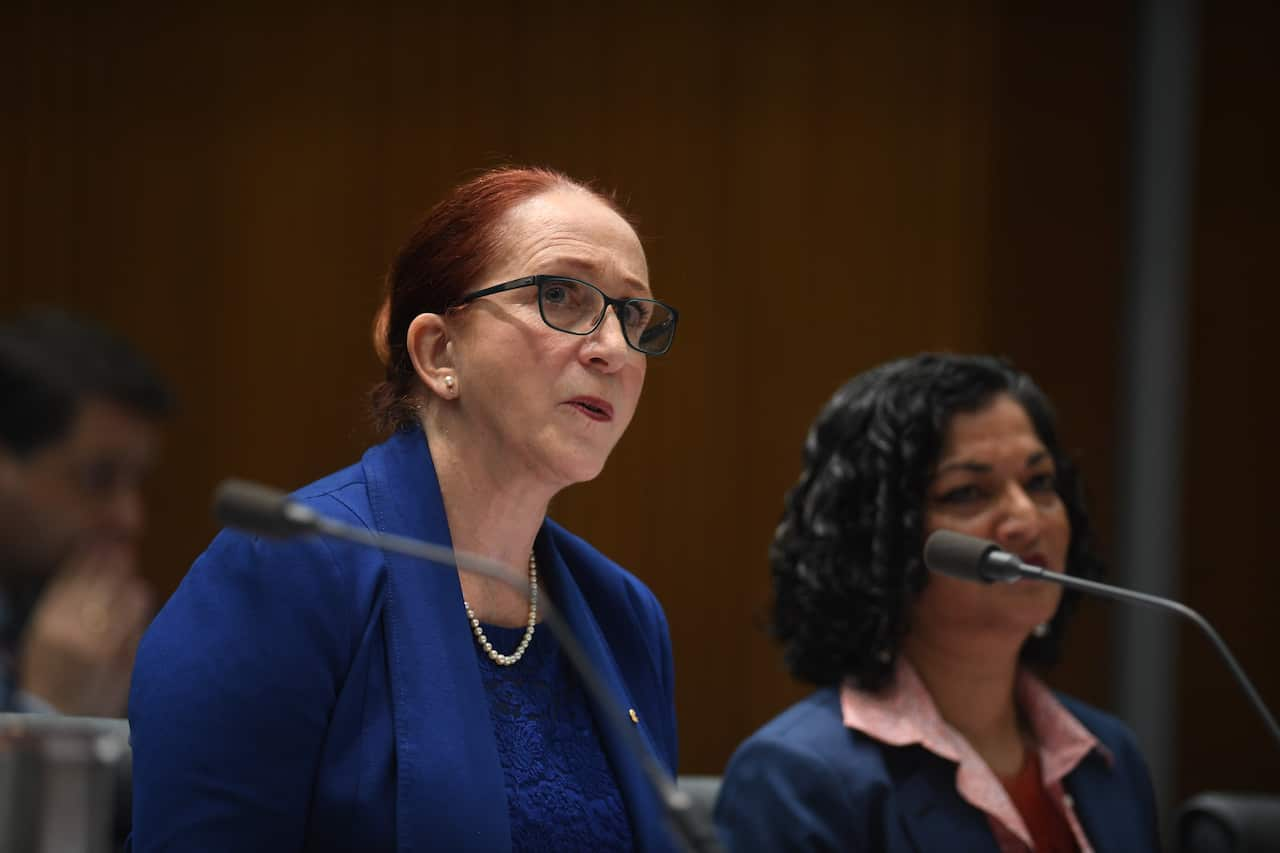A 19-year-old woman being forced to dress - while masked immigration officers stood on hand - is among a series of alleged human rights breaches being detailed in onshore detention.
The Australian Human Rights Commission examined 14 complaints from detainees being held in Australia and found nine of them contravened their access to liberty, privacy and dignity.
In another case, a mother was separated from her newborn baby for 32 hours and denied legal advice during this period.
The use of restraints also placed under scrutiny, reporting how one detainee was cuffed for eight hours suffering a ‘significant wrist wound’ in transit between detention centres.
The Department of Home Affairs disputes the findings of this new report saying none of the cases amounted to breaches of human rights.
But it has since changed internal policies after seeing a preliminary version of its findings.

Australian Human Rights Commission president Rosalind Croucher urged victims of the alleged misconduct to be compensated.
“Force should only ever be used as a last resort where alternatives such as negotiation and de-escalation techniques have been exhausted,” Ms Croucher wrote.
“Any use of force should be limited to what is essential in the circumstances and should be used only for the shortest amount of time necessary.”
A spokesperson from the Australian Border Force told SBS News the use of force in immigration detention must be proportionate to circumstances and only used as a final measure.
"Conflict and resolution techniques through negotiation and de-escalation are always used in the first instance," the spokesperson said.
"The Department does not agree that the use of force examined in the incidents was disproportionate or inconsistent with or contrary to the complainant's human rights."
The spokesperson said the Department was committed to "continuous improvement" and a comprehensive review had been undertaken since the time period of the report's findings.
"Updated operational policy instructions, which came into effect in January 2019, already address those AHRC recommendations accepted by the Department."
"The powers exercised by Australian Border Force ... are underpinned by clear risk-based policy guidance, training and decision making."
Most of the complaints examined were made by asylum seekers who had sought protection in Australia, with some of those since removed from the country.
The man who suffered a wrist wound was handcuffed for eight hours while being transferred between immigration facilities in Sydney and Perth.
But the Commission found no records seeking approval for the use of this restraint or why they were considered necessary.
Another man was forced to wear handcuffs for 12 hours on a flight between Christmas Island and Melbourne via Perth despite the Commission judging he posed no such security risk.
“The department’s response also suggests that force was used …. at least in part, because he was Vietnamese,” Ms Croucher wrote.
The Commission’s report found guidelines around the use of restraints in immigration detention ‘lack clarity’ compared to equivalent ones in the United Kingdom.
“I am concerned about examples of restraints being applied to people with low-security risk ratings … to a man diagnosed with a mental illness … a 17-year old boy, and to two men in wheelchairs,” Ms Croucher wrote.
In one case a man was detained with force on Christmas Island – his head pushed into a concrete floor knocking out his tooth.
It raised concerns that the risk assessment of detainees is not nuanced enough – defining swearing and physical aggression as under the category of bad behaviour.
As well as pushing for the end of a mandate requiring physically fit detained be restrained for the first 28 days of their detention - regarding them as high risk.
“People who are deprived of their liberty have the right to be treated with humanity and with respect for their inherent dignity,” Ms Croucher wrote.
“There must be a legitimate reason for using force, for example, in order to protect the safety of others, and the degree of force used should be proportionate to that legitimate reason.”
It has urged reform to "poor" record-keeping over the use of restraints and called for "effective oversight" of force to be ensured and to improve "systematic practical outcomes."
"It is not sufficient ... for a blanket approval to be given for restraints to be applied to any person," Ms Croucher wrote.
"The circumstances of individuals to be restrained still need to be taken into account individually.”

